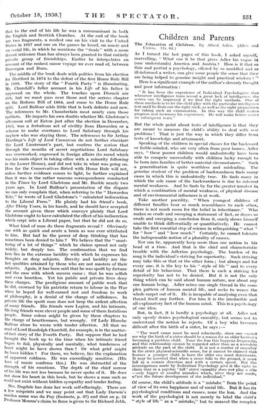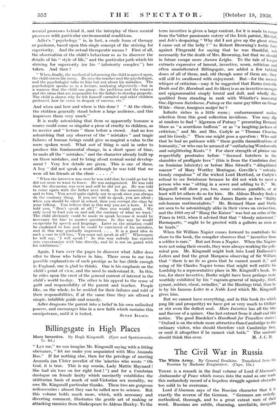Children and Parents
The Education of Children. By Alfred Adler. (Allen and Unwin. 12s. 6d.)
As I turned the last pages of this book, I asked myself; marvelling, " What can it be that gives Adler his vogue id (one understands) America and Austria ? How is it that so thin and partial a psychology, offered by so muddled and so ill-informed a writer, can give some people the sense that they are being helped to genuine insight and practical wisdom " Here is a significant example of the author's slovenly thought and poor information :
" It has been the experience of Individual Psychologists that whenever intelligence tests reveal a great lack of intelligence. the scores can he Unproved if we find the right methods. One of these methods is to let the child play with the particular intelligence test until ho finds out the right trick, as well as the right preparation for taking such an examination. In this way the child makes progress and increases his experience. He will make better scores on subsequent tests."
But the whole point about tests of intelligence is that they are meant to measure the child's ability to deal with veto problems ! That is just the way in which they differ from tests of knowledge and attainment.
Speaking of the children in special classes for the backward or feeble-minded, who are very often from poor homes, Adler says, " these poorer children would undoubtedly have been able to compete successfully with children lucky enough to be born into families of better material circumstances." Such a generalization is quite worthless and misleading. The genuine student of the problem of backwardness finds many eases in which this is undoubtedly true. Ile finds many in which the sole cause of the backwardness is due to inherent mental weakness. And he finds by far the greater number in which a combination of mental weakness, of physical disease and of environmental influences is at work.
Take another puerility. " When youngest children of different families bear so much resemblance to each other, there is not much room for the belief in inheritance." Who makes so crude and sweeping a statement of fact,, or draws so crude and sweeping a conclusion from it, surely shows himself unable to think differentially or quantitatively. He cannot take the first essential step of science in relinquishing " what " for " how " and " how much." Certainly, he cannot tolerate the indispensable notion of a plurality of causes.
Nor can he, apparently keep more than one notion in his head at a time. And that is the chief and characteristic trouble with the Adlerian psychology. The burden of its song is the individual's striving for superiority. Such striving may take this or that or the other form ; but always and for every one, it is the key to his " style of life " and to every detail of his behaviour. That there is such a striving for superiority has not to be denied. But it is not the only thing which can be said about human nature, nor about any one human being. Adler seizes one single thread in the corn. plex pattern of human mental life, and seeks to weave the whole carpet out of it. He is incapable of analysing even that thread itself any further. For him it is the irreducible and all-explanatory fact of the human mind. This is a psychology of one idea.
But, in fact, it is hardly a psychology at all. Adler not only openly denies psychological causality, but seems not to understand the notion he rejects. Of a boy who becomes difficult after the birth of a sister, he says :- " The word cause must be used reluctantly, since one cannot see why the birth of a sister should be a reason for an older brother', becoming a problem child. None the leas this happens frequently, and this relationship cannot be regarded other than as a mistaken attitude on the part of the child. It is not a mutter of causality in the strict physical-scientific sense, for it cannot be claimed that because a younger child is born the older one must deteriorate. It may bo asserted that when a stone falls to the ground, it must fall in a certain direction and with a certain speed. But the investigations made by Individual Psychology give it the right to claim that in a psychic ' fall ' strict causality does not play a idle —only bigger or smaller mistakes which, after they are made, arect the future development of the individual."
Of course, the child's attitude is a " mistake " from the point of view of its own happiness and of social life. But it has its psychological conditions and causes, none the less. And the work of the psychologist is not merely to label the child's " style of life " as a " mistake-," but to unravel the complex
mental processes behind it, and the interplay of those mental processes with particular environmental conditions. • Adler's " psychology " is, in fact, a crude form of therapy or guidance, based upon this single concept of the striving for superiority. And the actual therapeutic means ? First of all, the observation of the child's behaviour so as to discover the details of his " style of life," and the particular path which his striving for superiority (or his " inferiority complex ") has taken. And then ?
" When, finally, the method of influencing the child is agreed upon, the child enters the room. He sees the teacher and the psychologist, and the psychologist talks to him but not about his mistakes. The psychologist speaks as in a lecture, analysing objectively—but in a manner that the child can grasp—the problems and the reasons and the ideas that are responsible for the failure to develop properly. The child is shown why he felt himself curtailed and other children preferred, how he came to despair of success, etc."
And when and how and where is this done ? " At the clinic, the children generally stand before a large audience, and this impresses them very much."
It is really astonishing that from so apparently humane a source could come so singular a piece of cruelty to children, as to receive and lecture " them before a crowd. And no less astonishing that any observer of the " mistakes " and tragic failures of human beings could give so magical a value to the mere spoken word. What sort of thing is said in order to produce this fundamental change, in a short space of time, to undo all the " mistakes," and the character already built up on those mistakes, and to bring about normal social develop- ment ? Very few details are given. This is one of them. A boy " did not speak a word although he was told that we were all his friends at the clinic
"When the interview was over he was told that he could go but he did not seem to want to leave. He was antagonized. He was told that the discussion was over and still he did not go. He was told to come again with the father next week. In the meantime, we said to him, ' You acted quite rightly not to speak since you always do the contrary thing. If you are told to speak, you are silent ; when you should bo silent in school, then you corrupt the class by your talking. You believe that in this way you are a hero. If we told you, Don't speak at all ! " then you would speak. We only need to lead you on and ask the contrary of what we want.' The child obviously could be made to speak because it would be necessary for him to answer questions. In this way he would eo-operate by speech and language. Later on the situation could be explained to him and he could be convinced of his mistakes, and in this way gradually improved. . . . It is a good idea in such a ease to tell him, ' You must not speak at all ! ' Whereupon he will say, ' I will speak ! ' In this way nobody has entered into conversation with him directly, and he is not on guard with his inhibitions."
Again, I turn over the pages to discover what Adler does offer to those who believe in him. There seem to me two possible explanations of such prestige as he has (little enough in England, one is glad to think). One is his emphasis on the child's point of view, and the need to understand it. In this, he rides upon the crest of the general current of interest in the child's world to-day. The other is his appeal to the sense of guilt and responsibility of the parent and teacher. People like, on the whole, to be scolded for their failures and told of their responsibilities, if at the same time they are offered a simple, infallible guide and remedy.
Adler dragoons the parent into a belief in his own unlimited powers, and encourages him in a new faith which sustains this

























































 Previous page
Previous page